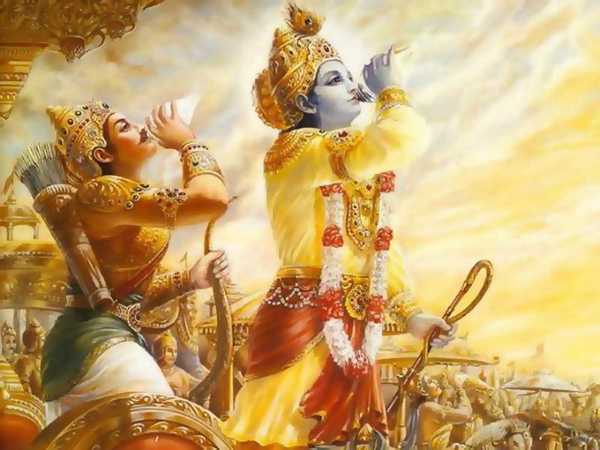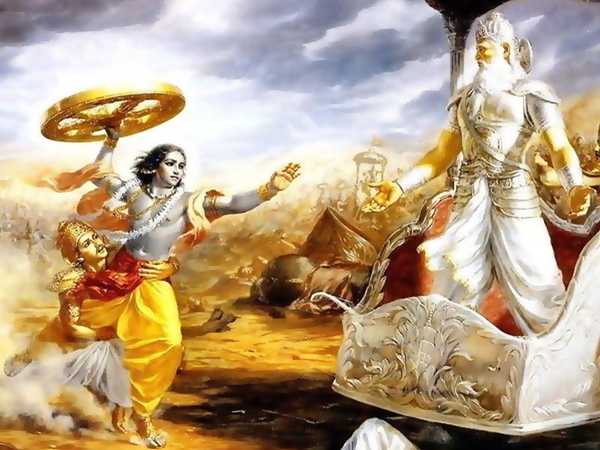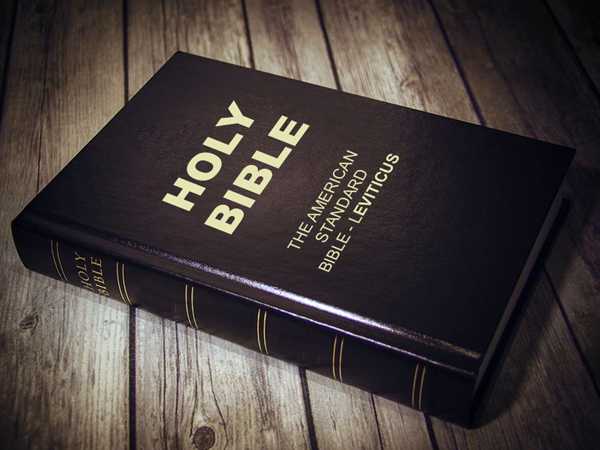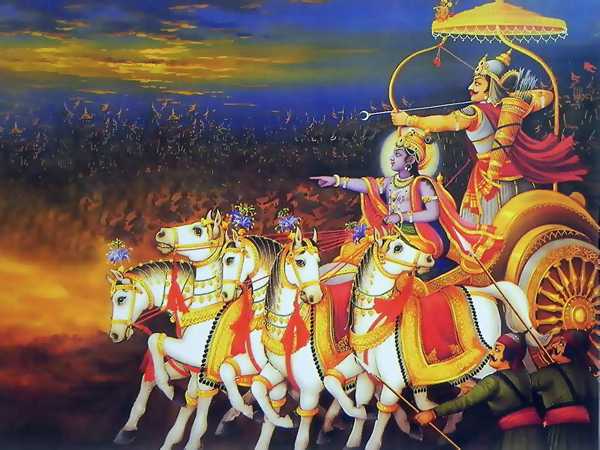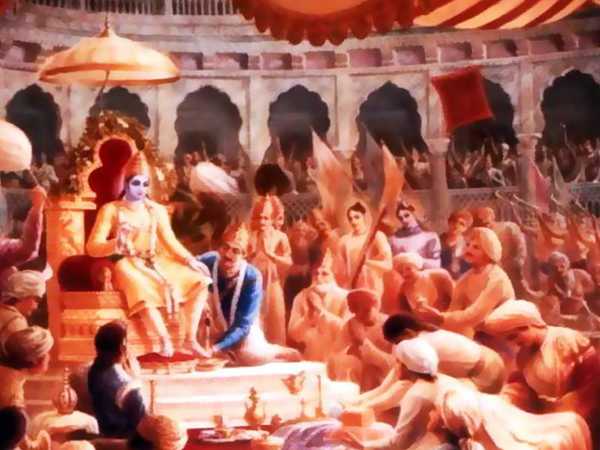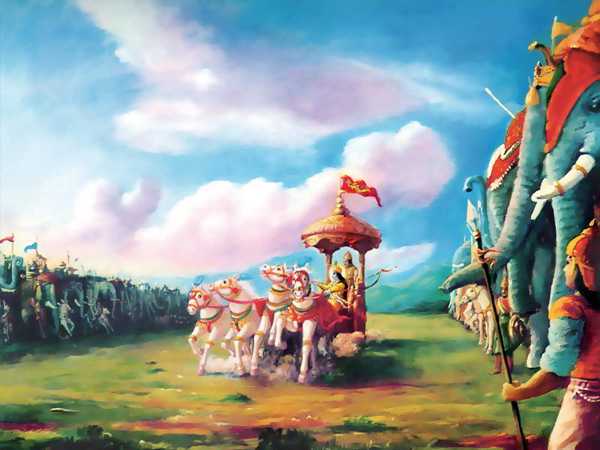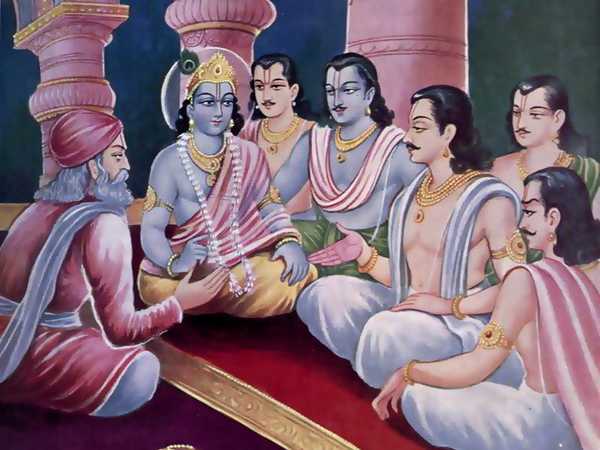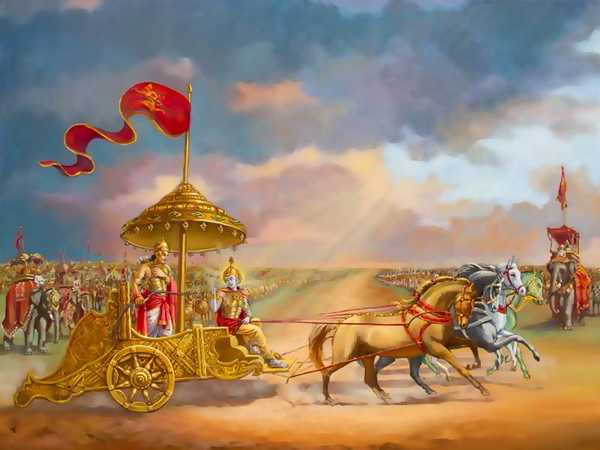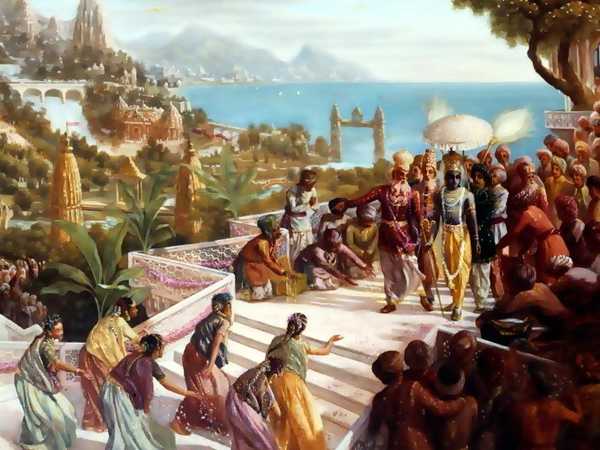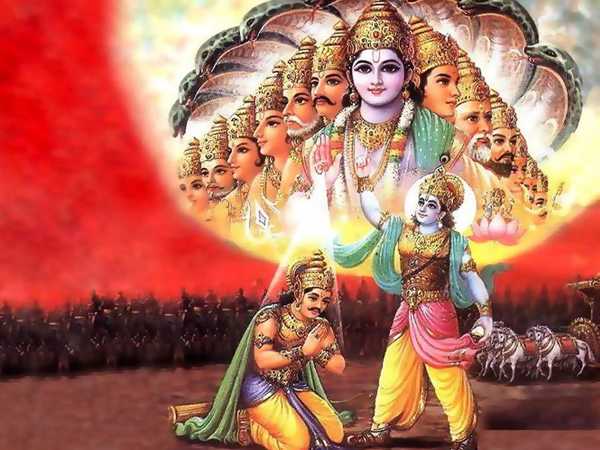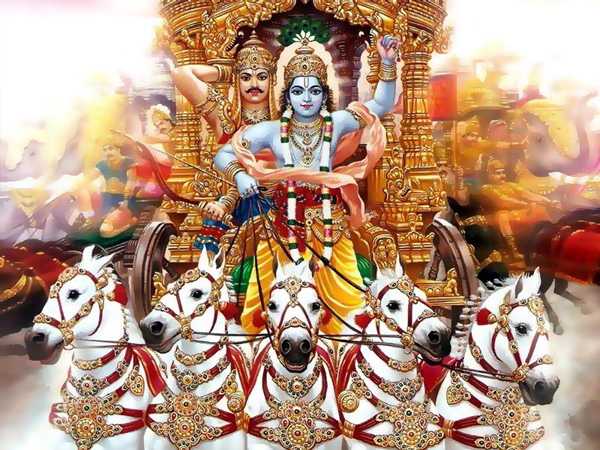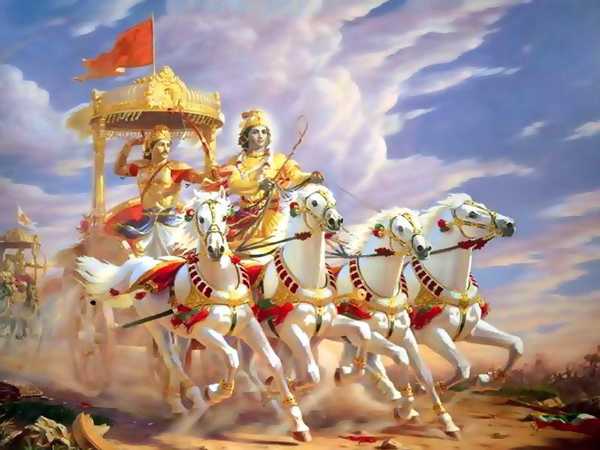Chapter 232
“Draupadi said, ‘I shall now indicate to thee, for attracting the heartof thy husbands a way that is free from deceit.
Chapter 232
“Vaisampayana said, ‘When the fire blazed forth in the forest ofKhandava, the infant birds became very much distressed and afflicted.Filled with anxiety, they saw not any means of escape. Their mother, thehelpless Jarita, knowing that they were too young to escape, was filledwith sorrow and wept aloud.
Chapter 232
“Vyasa said, ‘Brahma is the effulgent seed from which, existing as itdoes by itself, hath sprung the whole universe consisting of two kinds ofbeing, viz., the mobile and the immobile.
Chapter 233
Vaisampayana said, “Then Kesava, the slayer of Madhu, also calledJanardana, having conversed on various agreeable themes with theillustrious sons of Pandu and with those Brahmanas that were headed byMarkandeya and having bid them farewell, mounted his car and called forSatyabhama.
Chapter 233
Chapter 233
“Vyasa said, ‘I shall now tell thee, how, when his day is gone and hisnight comes, he withdraws all things unto himself, or how the SupremeLord, making this gross universe exceedingly subtile, merges everythinginto his Soul.
Chapter 234
Janamejaya said, “While those foremost of men–the sons of Pritha–werepassing their days in the forest exposed to the inclemencies of thewinter, the summer, the wind and the sun, what did they do, O Brahmana,after they had reached the lake and woods going by the name of Dwaita?”
Chapter 234
“Jaritari said, ‘The person that is wise remaineth wakeful in view ofdeath. Accordingly, when the hour of death approacheth, he feeleth nopangs. But the person of perplexed soul, who remaineth not awake, whenthe hour of death comes, feeleth the pangs of death and never attainethsalvation.’
Chapter 234
“Vyasa said, ‘Thou hadst asked me about the Creation of all beings; Ihave now narrated that to thee in full.
Chapter 235
Vaisampayana said, “Hearing those words of Dhritarashtra, Sakuni, whenthe opportunity presented itself, aided by Kama, spoke unto Duryodhanathese words,
Chapter 235
“Vaisampayana said, ‘O thou of Kuru’s race, the Rishi Mandapala becamevery anxious about his children, although he had spoken of them to thegod of fierce rays. Indeed, his mind was not in peace.
Chapter 235
“Vyasa said, ‘The knowledge called Trayi which occurs in the Vedas andtheir branches should be acquired.
Chapter 236
Vaisampayana said, “Having heard these words of Karna, king Duryodhanabecame highly pleased. Soon after, however, the prince became melancholyand addressing the speaker said, ‘What thou tellest me, O Karna, isalways before my mind.
Chapter 236
“Vaisampayana said, ‘Mandapala then addressed his children, saying, ‘Ihad spoken unto Agni for the safety of you all. The illustrious deity hadassured me that he would grant my wish.
Chapter 236
“Vyasa said, ‘If Emancipation be desirable, then knowledge should beacquired. For a person who is borne now up and now down along the streamof Time or life, knowledge is the raft by which he can reach the shore.
Chapter 237
Vaisampayana said, “They then all saw king Dhritarashtra, O Janamejaya,and having seen him, enquired after his welfare, and were, in return,asked about their welfare.
Chapter 237
“Vyasa said, ‘Borne up and down in life’s ocean, he that is capable ofmeditation seizes the raft of Knowledge and for achieving hisEmancipation adheres to Knowledge itself (without extending his armshither and thither for catching any other support).'[919]
Chapter 238
Vaisampayana said, “King Duryodhana then moving from forest to forest, atlast approached the cattle-stations, and encamped his troops.
Chapter 238
“Vyasa said, ‘These, then, are the obligatory acts ordained forBrahmanas. One possessed of knowledge always attains to success by goingthrough (the prescribed) acts.
Chapter 239
Vaisampayana said, “Those soldiers then, O king, all went back toDuryodhana and repeated to him every word that the Gandharvas had said.
Chapter 239
“Bhishma said, ‘Thus addressed (by his sire), Suka, highly applaudingthese instructions of the great Rishi, set himself about asking thefollowing, question relating to the import of duties that lead toEmancipation.’
Chapter 24
1 And Jehovah spake unto Moses, saying,
Chapter 24
“Sanjaya said, ‘When the loud noise of battle had somewhat subsided andthe Pandavas had slain large numbers of their foes, Subala’s son (oncemore) came for fight with the remnant of his horsemen numbering sevenhundred.
Chapter 24
“Yudhishthira said, ‘O royal son of Bharata’s race, it behoveth thee toanswer this question of mine truly and in detail. What are thosecircumstances under which a person may become guilty of Brahmanicidewithout actually slaying a Brahmana!’
Chapter 24
“Vaisampayana said, ‘The Pandavas alighted, at a distance, from theircars and proceeded on foot to the retreat of the king, bending themselvesin humility.
Chapter 24
“Sanjaya said, ‘It is even so as thou hast said, O son of Pandu! Dostthou enquire about the welfare of the Kurus and of the foremost onesamong them?
Chapter 24
Dhritarashtra said,–“There (on the field of battle) O Sanjaya, thewarriors of which side first advanced to battle cheerfully?
Chapter 24
1 And when Balaam saw that it pleased Jehovah to bless Israel, he went not, as at the other times, to meet with enchantments, but he set his face toward the wilderness.
Chapter 24
“Sanjaya said, ‘While Nakula was employed in destroying and routing theKaurava divisions in battle with great force, Vikartana’s son Karna,filled with rage, checked him, O king.
Chapter 24
1 And he said unto Moses, Come up unto Jehovah, thou, and Aaron, Nadab, and Abihu, and seventy of the elders of Israel; and worship ye afar off:
Chapter 24
“Vaisampayana said, ‘And beholding the Sutas slain, the citizens went tothe king, and represented unto him what had happened, saying, ‘O king,those mighty sons of the Sutas have all been slain by the Gandharvas.
Chapter 24
“Sauti said, ‘Then hearing of and beholding his own body, that bird ofbeautiful feathers diminished its size.’
Chapter 24
1 And Abraham was old, [and] well stricken in age. And Jehovah had blessed Abraham in all things.
Chapter 24
Vaisampayana said, “After they had departed, Yudhishthira the virtuousson of Kunti, unwavering in his promises, addressed all his brothers,saying, ‘We shall have to dwell in the solitary forest for these twelveyears.
Chapter 24
Vaisampayana said, “Once more the great sage Krishna-Dwaipayana saidthese words unto Ajatasatru, the son of Kunti
Chapter 24
“Gandhari said, Behold the son of Somadatta, who was slain by Yuyudhana,pecked at and torn by a large number of birds! Burning with grief at thedeath of his son, Somadatta,
Chapter 24
“The Brahmana said, ‘In this connection is cited the ancient story of thediscourse between Narada and the Rishi Devamata.’
Chapter 24
“Dhritarashtra said, ‘When the troops were thus engaged and thusproceeded against one another in separate divisions, how did Partha andthe warriors of my army endued with great activity fight?
Chapter 24
1 When a man taketh a wife, and marrieth her, then it shall be, if she find no favor in his eyes, because he hath found some unseemly thing in her, that he shall write her a bill of divorcement, and give it in her hand, and send her out of his house.
Chapter 240
Vaisampayana said, “After that great warrior Karna had been routed by theGandharvas, the whole of the Kuru army, O monarch, fled from the field inthe very sight of Dhritarashtra’s son.
Chapter 240
“Vyasa said, ‘O excellent son, asked by thee, I have told thee truly whatthe answer to thy question should be according to the doctrine ofknowledge as expounded in the Sankhya system.
Chapter 241
“Yudhishthira said, ‘O child, why dost thou use language such as this,towards the frightened Kurus, who are now in adversity and who have cometo us, solicitous of protection! O Vrikodara, disunions and disputes dotake place amongst those that are connected in blood.
Chapter 241
“Suka said, ‘The declarations of the Vedas are twofold. They once Jaydown the command, ‘Do all acts.’ They also indicate (the reverse,saying), ‘Give up acts.’
Chapter 242
Vaisampayana said, “Hearing the words of Yudhishthira, those bulls amongmen, headed by Bhimasena, rose up with faces beaming in joy.
Chapter 242
“Suka said, ‘I have now understood that there are two kinds of creation,viz., one commencing with Kshara (which is universal), and which is fromthe (universal) Soul. The other, consisting of the senses with theirobjects, is traceable to the puissance of the knowledge.
Chapter 243
Vaisampayana said, “Then those Gandharvas decked in golden garlands andaccomplished in celestial weapons, showing their blazing shafts,encountered the Pandavas from every side.
Chapter 243
“Vyasa said, ‘Observant of meritorious vows, the householder, for thesecond period of life, should dwell in his house, having taken spousesaccording to the ways indicated in the ordinance and having establishedafire (of his own).
Chapter 244
Vaisampayana said, “Then that mighty bowman of blazing splendour, Arjuna,smilingly said unto Chitrasena in the midst of the Gandharva host, ‘Whatpurpose dost thou serve, O hero, in punishing the Kauravas? O, why alsohath Suyodhana with his wives been thus punished?’
Chapter 244
“Bhishma said, “Though hast been told what the duties of domesticity areas ordained by the wise. Listen now, O Yudhishthira, to what those dutiesare that have been next spoken of.
Chapter 245
Janamejaya said, “After his defeat and capture by the foe and hissubsequent liberation by the illustrious sons of Pandu by force of arms,it seemeth to me that the entry into
Chapter 245
“Suka said, ‘While living in the due observance of the duties of theforemost of life, how should one, who seeks to attain to That which isthe highest object of knowledge, set one’s soul on Yoga according to thebest of one’s power?’
Chapter 246
“Duryodhana said, ‘O Radheya, thou knowest not what hath happened.Therefore, I do not resent thy words. Thou thinkest the hostileGandharvas to have been vanquished by me with my own energy.
Chapter 246
“Vyasa said, ‘The Jiva-soul is endued with all those entities that aremodifications of Prakriti. These do not know the Soul but the Soul knowsthem all.
Chapter 247
Duryodhana said, “That slayer of hostile heroes, Arjuna, then approachingChitrasena, smilingly addressed him in these manly words: ‘O hero, Oforemost of the Gandharvas, it behoveth thee to set my brothers atliberty.
Chapter 247
“Suka said, ‘O illustrious one, O foremost of Rishis, once againdiscourse to me on Adhyatma more elaborately. Tell me what, indeed, isAdhyatma and whence does it come?'[1041]
Chapter 248
“Kama continued, ‘O king, this conduct of thine to-day appeareth to bechildish. O hero, O slayer of foes, what is to be wondered at in thisthat the Pandavas liberated thee when thou wert vanquished by the foe?
Chapter 248
“Vyasa said, ‘The mind creates (within itself) numerous ideas (of objectsor existent things). The Understanding settles which is which.
Chapter 249
Vaisampayana said, “Beholding king Duryodhana, incapable of putting upwith an insult, seated with the resolution of giving up life by forgoingfood, Sakuni, the son of Suvala, said these words to comfort him. Sakunisaid,
Chapter 249
“Vyasa said, ‘The objects by which one is surrounded are created by theunderstanding. The Soul, without being connected with them, stands aloof,presiding over them.
Chapter 25
1 And Jehovah spake unto Moses in mount Sinai, saying,
Chapter 25
“Sanjaya said, ‘Dhananjaya, with his Gandiva, frustrated the purpose ofthose unreturning heroes struggling in battle and striking their foes.
Chapter 25
“Yudhishthira said, ‘It has been said that sojourns to sacred waters asfraught with merit; that ablutions in such waters is meritorious; andthat listening to the excellence of such waters is also meritorious.
Chapter 25
“Vaisampayana said, ‘The king, O chief of Bharata’s race, with thoseforemost of men, viz., his brothers, who were all possessed of eyes thatresembled lotus-petals, took his seat in the retreat of his eldest sire.
Chapter 25
“Yudhishthira said, ‘Here are met the Pandavas and the Srinjayas, andKrishna, and Yuyudhana and Virata, O son of the Suta Gavalgana, tell usall that Dhritarashtra hath directed thee to say.’
Chapter 25
([This where is the Bhagavad Gita proper starts. I have added the chapterheadings to aid in comparison with other translations, they are not partof the original Ganguli text.–John Bruno Hare])
Chapter 25
Vaisampayana said,–Arjuna, having obtained that best of bows and thatcouple of inexhaustible quivers and that car and flag-staff, as also thatassembly-house, addressing Yudhisthira said,–Bow, weapons, great energy,allies, territory, fame, army-those, O king, difficult of acquisitionhowever desirable, have all been obtained by me.
Chapter 25
1 And Israel abode in Shittim; and the people began to play the harlot with the daughters of Moab:
Chapter 25
1 And Jehovah spake unto Moses, saying,
Chapter 25
“Sanjaya said, ‘Against Yuyutsu who was employed in routing the vast armyof thy son, Uluka proceeded with speed saying “Wait, Wait.”
Chapter 25
“Vaisampayana said, ‘At the slaughter of Kichaka and brothers, people, Oking, thinking of this terrible feat, were filled with surprise.
Chapter 25
“Sauti said, ‘Then that bird of great strength and energy and capable ofgoing at will to every place repaired to his mother’s side on the othershore of the great ocean.
Chapter 25
1 And Abraham took another wife, and her name was Keturah.
Chapter 25
Vaisampayana said, “Having fallen into distress, those princes thusobtained at last a pleasant habitation in that forest. And there in thosewoods abounding with Sala trees and washed by the Saraswati, they whowere like so many Indras, began to sport themselves.
Chapter 25
Vaisampayana said, “Hearing the words of the Island-born Rishi and seeingDhananjaya angry, Yudhishthira, the son of Kunti, saluted Vyasa and madethe following answer.
Chapter 25
“Gandhari said, Behold that irresistible ruler of the Kambojas, thatbull-necked hero, lying amid the dust, O Madhava, though deserving ofbeing stretched at his ease on Kamboja blankets.
Chapter 25
“The Brahmana said, ‘In this connection is recited the ancient story ofwhat the institution is of the Chaturhotra (sacrifice). The ordinancesare now being duly declared of that in its entirety.
Chapter 25
“Sanjaya said, ‘Thou askest me about the feats of Arjuna in battle.Listen, O thou of mighty arms, to what Partha achieved in the fight.
Chapter 25
1 If there be a controversy between men, and they come unto judgment, and [the judges] judge them; then they shall justify the righteous, and condemn the wicked;
Chapter 250
“The Danavas said, ‘O Suyodhana, O great king? O perpetuator of the raceof Bharata, thou art ever surrounded by heroes and illustrious men. Whyhast thou, then, undertaken to do such a rash act as the vow ofstarvation?
Chapter 250
“Suka said, ‘Let thy reverence tell me of that which is the foremost ofall duties, indeed, of that duty above which no higher one exists in thisworld.’
Chapter 251
Janamejaya said, “When the high-souled sons of Pritha were living in theforest, what did those foremost of men and mighty archers–the sons ofDhritarashtra–do?
Chapter 251
“Vyasa said, ‘One should not show any affection for scents and tastes andother kinds of enjoyment. Nor should one accept ornaments and otherarticles contributing to the enjoyment of the senses of scent and taste.
Chapter 252
Vaisampayana continued, “Then, O bull among the Bharatas, that mightybowman, Karna, surrounded by a large army, besieged the beautiful city ofDrupada.
Chapter 252
“Vyasa said, ‘Unto a disciple that wishes to enquire after Emancipationafter having transcended all pairs of opposites and accomplished theconcerns of both profit and religion, an accomplished preceptor shouldfirst recount all that has been said in the foregoing section, which iselaborate, on the topic of Adhyatma.
Chapter 253
Vaisampayana continued, “O king, O lord of men, that slayer of hostileheroes, the Suta’s son, said these words to Duryodhana, ‘O KauravaDuryodhana, do thou lay unto thy heart the words that I shall tell thee;and, O represser of foes, after having heard my words, it behoveth theeto act accordingly every way.
Chapter 253
“Vyasa said, ‘Those that are conversant with the scriptures behold, withthe aid of acts laid down in the scriptures, the Soul which is clothed ina subtile body and is exceedingly subtile and which is dissociated fromthe gross body in which it resides.
Chapter 254
Vaisampayana continued, “Then all the artisans, the principalcounsellors, and the highly wise Vidura said unto Dhritarashtra’s son,”All the preparations for the excellent sacrifice have been made, O king;and the time also hath come, O Bharata.
Chapter 254
“Vyasa said, ‘There is a wonderful tree, called Desire, in the heart of aman. It is born of the seed called Error. Wrath and pride constitute itslarge trunk.
Chapter 255
Vaisampayana said, “While, O great king, Duryodhana was entering (thecity), the panegyrists eulogized the prince of unfailing prowess. Andothers also eulogized that mighty bowman and foremost of kings.
Chapter 255
“Bhishma said, ‘Do thou, O son, O sinless one, listen once more, withfeelings of great pride, to the words that fell from the lips of theIsland-born Rishi on the subject of the enumeration of the entities.
Chapter 256
“Yudhishthira said, ‘These lords of earth that lie on the earth’s surfaceamid their respective hosts, these princes endued with great might, arenow reft of animation. Every one of these mighty monarchs was possessedof strength equal to that of ten thousand elephants.
Chapter 256
Janamejaya said, ‘After having delivered Duryodhana, what did the mightysons of Pandu do in that forest? It behoveth thee to tell me this.’
Chapter 257
“Sthanu said, ‘Know, O lord, that my solicitations to thee are on behalfof the created beings of the universe. These beings have been created bythee. Do not be angry with them, O grandsire! By the fire born of thyenergy, O illustrious one, all the created beings are being consumed.Beholding them placed in such a plight, I am penetrated with compassion.Do not be angry with them, O lord of the universe.’
Chapter 257
Vaisampayana continued, “Dwelling in the woods, O bull of the Bharatarace, the high-souled Pandavas spent one and ten years in a miserableplight.
Chapter 258
Yudhishthira said, “Why did that high-souled one give away a drona ofcorn? And, O eminently pious one, to whom and in what prescribed way didhe give it? Do thou tell me this.
Chapter 258
“Narada said, ‘The large-eyed lady, controlling her grief by an effort ofher own, addressed the Grandsire, with joined hands and bending in anattribute of humility like a creeper.
Chapter 259
“The messenger of the gods said, ‘O great sage, thou art of simpleunderstanding; since, having secured that celestial bliss which bringethgreat honour, thou art still deliberating like an unwise person.
Chapter 259
“Yudhishthira said, ‘All men that inhabit this earth are filled withdoubts in respect of the nature of righteousness.
Chapter 26
1 Ye shall make you no idols, neither shall ye rear you up a graven image, or a pillar, neither shall ye place any figured stone in your land, to bow down unto it: for I am Jehovah your God.
Chapter 26
“Sanjaya said, ‘After that elephant-division had been destroyed, OBharata, by the son of Pandu, and while thy army was being thusslaughtered by


